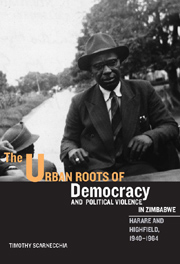Book contents
- Frontmatter
- Contents
- List of Illustrations
- Acknowledgments
- List of Abbreviations
- Notes to the Reader
- Introduction
- 1 Charles Mzingeli's Leadership and Imperial Working-Class Citizenship
- 2 Township Protest Politics
- 3 Resistance to the Urban Areas Act and Women's Political Influence
- 4 Changing Tactics: Youth League Politics and the End of Accommodation
- 5 The Early Sixties: Violent Protests and “Sellout” Politics
- 6 The “Imperialist Stooge” and New Levels of “Sellout” Political Violence
- 7 The ZAPU-ZANU Split and the Battlegrounds of Harare and Highfield
- Conclusion
- Notes
- Selected Bibliography
- Index
- Title in the series
2 - Township Protest Politics
Published online by Cambridge University Press: 12 September 2012
- Frontmatter
- Contents
- List of Illustrations
- Acknowledgments
- List of Abbreviations
- Notes to the Reader
- Introduction
- 1 Charles Mzingeli's Leadership and Imperial Working-Class Citizenship
- 2 Township Protest Politics
- 3 Resistance to the Urban Areas Act and Women's Political Influence
- 4 Changing Tactics: Youth League Politics and the End of Accommodation
- 5 The Early Sixties: Violent Protests and “Sellout” Politics
- 6 The “Imperialist Stooge” and New Levels of “Sellout” Political Violence
- 7 The ZAPU-ZANU Split and the Battlegrounds of Harare and Highfield
- Conclusion
- Notes
- Selected Bibliography
- Index
- Title in the series
Summary
The period of demobilization after World War II was a crucial one for Pan-African politics, as soldiers, workers, and intellectuals found common ground through their demands for better treatment and representation. Mzingeli's contacts with other Pan-Africanists may not have been extensive beyond his reading of Pan-African newspapers and pamphlets, but his politics suggest that he was working within the ideological framework of other African and African Diaspora political movements of this period. The RICU had taken shape by September 1946, and Mzingeli was trying his best to call attention to the government's hypocrisy in sending African troops to fight the Japanese in Burma while failing to recognize Africans at home as “workers” under the Industrial Conciliation Act. Mzingeli told the RICU meeting:
If the legislator saw fit in 1934, that African is not fit to be included in the Conciliation Act, they also saw it fit in 1940, that an African is capable of defending democracy against Nazis and Fascist horders whose doctrine was oppression of the working classes. The democracies armed themselves not only with forces of all nations irrespective of colour or creeds, but also with eight points from the Atlantic Ocean. The points include provision of freedom for all persons that include Africans as well. Also we have entered [a] New World so much promised during years of hostility therefore to deny an African a recognition as an employee is not only undemocratic but is committing suicide of social and economic justice.
- Type
- Chapter
- Information
- The Urban Roots of Democracy and Political Violence in ZimbabweHarare and Highfield, 1940–1964, pp. 29 - 48Publisher: Boydell & BrewerPrint publication year: 2008



